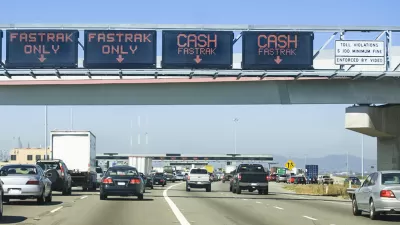It's time to fund federal transportation like most other nations do—rely less on highway user fees that dedicate funds to highways and transition to funding roads from the general fund, perhaps in the same amount that they contribute to GDP.
Joshua L. Schank, president and chief executive of the Eno Center for Transportation, makes a convincing case in this New York Times op-ed for essentially ditching the Highway Trust Fund - a protected, dedicated source of funding that was born with the interstate highway system, and relying more on dedicated general funds that he believes will be "somewhat insulated from the political forces that surround transportation funding, and more focused on getting the federal government the maximum return on its investments."
No other developed nation relies so heavily on user fees like the gas tax. While other countries typically have much higher gas taxes, they do not dedicate these revenues to transportation. Instead, they use general revenues.
So should America. One option is to dedicate part of the income tax revenue that corresponds to transportation’s contribution to gross domestic product, or about 10 percent (around $160 billion). Dedicating even half of that to transportation would cover America’s needs and effectively align transportation with economic growth.
After all, that's exactly what this country has been doing since 2008. "We have infused the trust fund with over $55 billion in general fund revenues (not including stimulus funding), and proposals from the president and the House of Representatives have called for $150 billion and $125 billion more, respectively, both funded through corporate tax reform," he writes.
The problem with these actions and proposals is that they are one-time, short-term fixes, while transportation projects take years to complete. Effective modern transportation is less about building more highways, and more about operating our existing systems more effectively while harnessing the benefits of technology.
Eno's suggestion goes against the user-fee principle that has been the basis of federal and state transportation funding for almost a century, beginning with Oregon's 1919 gas tax. [The federal government was a little late to the game, initiating its per-gallon tax in 1932.] It adds a new dimension to transportation funding policy that leaders should take seriously, particularly those who oppose raising taxes.
FULL STORY: America’s Highways, Running on Empty

Maui's Vacation Rental Debate Turns Ugly
Verbal attacks, misinformation campaigns and fistfights plague a high-stakes debate to convert thousands of vacation rentals into long-term housing.

Planetizen Federal Action Tracker
A weekly monitor of how Trump’s orders and actions are impacting planners and planning in America.

In Urban Planning, AI Prompting Could be the New Design Thinking
Creativity has long been key to great urban design. What if we see AI as our new creative partner?

King County Supportive Housing Program Offers Hope for Unhoused Residents
The county is taking a ‘Housing First’ approach that prioritizes getting people into housing, then offering wraparound supportive services.

Researchers Use AI to Get Clearer Picture of US Housing
Analysts are using artificial intelligence to supercharge their research by allowing them to comb through data faster. Though these AI tools can be error prone, they save time and housing researchers are optimistic about the future.

Making Shared Micromobility More Inclusive
Cities and shared mobility system operators can do more to include people with disabilities in planning and operations, per a new report.
Urban Design for Planners 1: Software Tools
This six-course series explores essential urban design concepts using open source software and equips planners with the tools they need to participate fully in the urban design process.
Planning for Universal Design
Learn the tools for implementing Universal Design in planning regulations.
Appalachian Highlands Housing Partners
Gallatin County Department of Planning & Community Development
Heyer Gruel & Associates PA
Mpact (founded as Rail~Volution)
City of Camden Redevelopment Agency
City of Astoria
City of Portland
City of Laramie



























